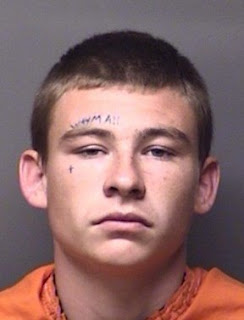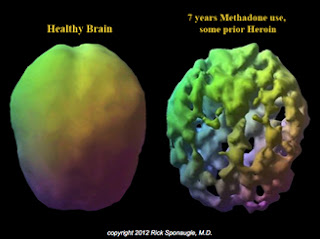In March, the commander in chief of the War on Drugs stood in front of a crowd of policymakers, advocates and recovering addicts to declare that America has been doing it wrong.
Speaking at the National Prescription Drug Abuse and Heroin Summit in Atlanta – focused on an overdose epidemic now killing some 30,000 Americans a year – President Barack Obama declared, "For too long we have viewed the problem of drug abuse ... through the lens of the criminal justice system," creating grave costs: "We end up with jails full of folks who can't function when they get out. We end up with people's lives being shattered."
Touting a plan to increase drug-treatment spending by more than $1 billion – the capstone to the administration's effort to double the federal drug-treatment budget – Obama insisted, "This is a straightforward proposition: How do we save lives once people are addicted, so that they have a chance to recover? It doesn't do us much good to talk about recovery after folks are dead."
Obama's speech underscored tactical and rhetorical shifts in the prosecution of the War on Drugs – the first durable course corrections in this failed 45-year war. The administration has enshrined three crucial policy reforms. First, health insurers must now cover drug treatment as a requirement of Obamacare. Second, draconian drug sentences have been scaled back, helping to reduce the number of federal drug prisoners by more than 15 percent. Third, over the screams of prohibitionists in its ranks, the White House is allowing marijuana's march out of the black market, with legalization expected to reach California and beyond in November.
The administration's change in rhetoric has been even more sweeping: Responding to opioid deaths, Obama appointed a new drug czar, Michael Botticelli, who previously ran point on drug treatment in Massachusetts. Botticelli has condemned the "failed policies and failed practices" of past drug czars, and refers not to heroin "junkies" or "addicts" but to Americans with "opioid-abuse disorders."
"One of the biggest reasons why people don't seek care is shame and stigma," Botticelli told reporters last year. "What we've been trying to do is change the language."
Despite strides toward a more sane national drug policy, the deeper infrastructure of the War on Drugs careplaced paramilitary anti-trafficking efforts, known as interdiction, at home or abroad. Rather – much like an "all of the above" energy strategy that embraces solar while continuing to remove mountaintops in pursuit of coal – the new policies supplement the old.
As a result, the Drug War is costing taxpayers more than ever. Obama's 2017 drug budget seeks $31 billion, an increase of 25 percent from when he took office. This year, the federal government is spending more than $1,100 per person to combat the habit of America's 27 million illicit-drug users, and 22 million of them use marijuana.
"One of the biggest reasons why people don't seek care is shame and stigma," Botticelli told reporters last year. "What we've been trying to do is change the language."
Despite strides toward a more sane national drug policy, the deeper infrastructure of the War on Drugs careplaced paramilitary anti-trafficking efforts, known as interdiction, at home or abroad. Rather – much like an "all of the above" energy strategy that embraces solar while continuing to remove mountaintops in pursuit of coal – the new policies supplement the old.
As a result, the Drug War is costing taxpayers more than ever. Obama's 2017 drug budget seeks $31 billion, an increase of 25 percent from when he took office. This year, the federal government is spending more than $1,100 per person to combat the habit of America's 27 million illicit-drug users, and 22 million of them use marijuana.
Original story at
JUST MY OPINION
The war on drugs can be in some regards compared to the war on terror. A never ending money wasting con game by the government to control the citizens of this country. I'm in no way advocating legalization of all drugs, but it is abundantly obvious the policies of the last 45 years are a complete and utter failure. The only way to make any progress is to change the mindset. We must stop looking at addiction as a criminal justice problem and start looking at it for what it truly is; a medical problem. Addiction without question is a chronic relapsing brain disorder.
The problem is the government can't change or won't change it's policies because the war on drugs employs too many people. I'm not going to even begin to list them because it's quite obvious. Now with the privatization of prisons for profit we can forget about any changes in the near future. When a society allows private companies to make profits off the people we incarcerate then there is no way laws will change because these corporations lobby congress and give campaign contributions. Corporate America hijacked this country a long time ago and their aim is to eradicate the middle class.
How many people know that the United States of America does not print or have a say in the printing of the dollar? Our money is printed by a privately owned company called the Federal Reserve Bank. This bank is not federal at all. We the people have no say in when or how much cash is printed. The Federal Reserve Bank prints money and then loans it to the government. Yes, I said loans it and with interest. So, how then can a government borrow it's own currency, be expected to pay this back with interest? Where does the money come from to pay back the loans? It comes in the form of new loans.
Thomas Jefferson said “If the American people ever allow private banks to control the issue of their money, first by inflation and then by deflation the banks and corporations that will grow up around them (around the banks), will deprive the people of their property until their children will wake up homeless on the continent their fathers conquered.”
“And I sincerely believe, with you, that banking establishments are more dangerous than standing armies"




Comments
Post a Comment